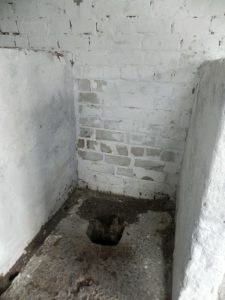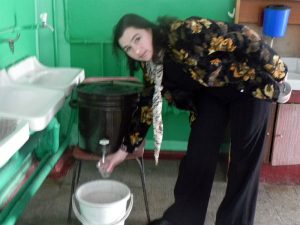Location
Kalynivka, Yelanets Rayon, Mykolayiv Oblast, Ukraine
Community Description
Kalynivka is a small village in southcentral Ukraine. During Soviet times, Kalynivka was a large, thriving town with a heavily-trafficked music school, house of culture, equestrian school, pre-school and grade school. The fall of the Soviet Union and successive economic hardships in Ukraine caused many public buildings to fall into disrepair due to a lack of government funding.
Kalynivka’s pre-school and grade school are the only public buildings still used from the above list. With a population of only 800, there is no public building as heavily trafficked as the local school. School and community concerts, school-wide contests and community celebrations are all held in the school’s auditorium.
The school cafeteria is the only room that still has running water, but only between the hours of 7-9 am each morning and sometimes not even then.
Currently, when students need to use the restroom, they put on their coats and walk around the school to a small cement hut about thirty yards behind the school. The left half of the hut has a few holes dug into the ground for boys and a wall in the middle separates them from the few holes on the other side for the girls.
When the teachers need to use the restroom, they put on their coats and walk around the school to a wooden outhouse about forty yards behind the school.
Though the school has two indoor toilets and four sinks, they have not been used in years due to a lack of water and dirty pipes. Lack of adequate indoor sanitation in the school, especially during winter when temperatures drop as low as -25 degrees Celsius, contributes to flu and viral epidemics each school year.
Specialists have confirmed that there is a large, abundant water source located 15 meters below the ground that can be tapped into to restore running water to the school.
Project Description
This project is to bring water to the Kalynivka School for use in the cafeteria and bathrooms.
 Connection will be made to an underground water source, and existing kitchen and bathroom fixtures will be made functional. Finally, a water filter will be installed in the cafeteria.
Connection will be made to an underground water source, and existing kitchen and bathroom fixtures will be made functional. Finally, a water filter will be installed in the cafeteria.
Specialists will be brought in to drill and find the nearby source of underground water. The motor, drill and specialists have been estimated to cost $400. The rest of the project will be completed with the remaining funds and through community donations of time and labor.
A motor will be rented to drill 15 meters below ground just behind the cafeteria where there is a large, underground water source, which serves those in the community who have indoor plumbing. A team of parent volunteers will assist one specialist with the drilling, so the cost of drilling will be minimal.
New pipes will be purchased to replace the old and rusty pipes that are no longer usable. Once the drilling is complete, parent volunteers with experience in plumbing will install these pipes.
The two toilets and four sinks already in the school have been cleaned and maintained, but the old pipes have fallen into disrepair due to lack of use. Once new pipes are installed the indoor toilets and sinks will be ready for use.
Finally, a large water filter will be purchased for use in the cafeteria. The water currently used in the school is not clean, and, though the water is boiled first, the children are served soup every day in the cafeteria.
Project Impact
85 children, 18 teachers and 6 staff will benefit daily from the improvements. In addition, hundreds of community members who regularly attend school and community events will benefit various times throughout the year.
Peace Corps Volunteer Directing Project
Anne Benson
Comments
An unlimited source of running water for the toilets, sinks and cafeteria will create a healthier environment for students, teachers and community members. It will ease the workload of the school staff, who currently have to carry buckets of water to and from school to do the necessary cooking and cleaning.
Dollar Amount of Project
$555.00
Donations Collected to Date
$555.00
Dollar Amount Needed
$0.00 – This project has now been fully funded through the generosity of Frank Kirchner, of Nashville, TN, USA.
We encourage others to continue to donate using the Donate button below, and we will notify Peace Corps Volunteer Anne Benson of your donation. Additional funds will be used to fund the next project by Anne and/or those of other PCVs in the country of service.
![]() This project has been finished. To read about the conclusion of the project, CLICK HERE.
This project has been finished. To read about the conclusion of the project, CLICK HERE.